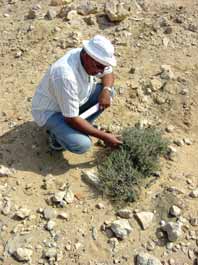
Go to the project website.
SUMAMAD aims at enhancing the sustainable management and conservation of marginal drylands in northern Africa and Asia. Drylands are particularly vulnerable due to climatic and human pressures, yet they constitute some of the world's largest land reserves in terms of space and natural resources. Their increased productivity, which is needed to meet the demands of exponential population growth, needs however to be embedded in wise practices that both respect the conservation of the environment, and provide improved and alternative livelihoods for dryland populations. The project is to identify management approaches that promote economic sustainability and resource conservation, in particular of soils and water, and it to foster the rehabilitation of degraded drylands using community-based approaches. It is to work in selected study sites in the countries involved to compare results and share knowledge. Socio-economic surveys are to identify people's adaptation and traditional knowledge in coping with adverse dryland conditions. Training, capacity building and interaction with landowners, farmers and other stakeholders, with a focus on sustainable and indigenous dryland management practices, are to be key elements of the project.
The SUMAMAD project is funded by the Flemish Government of Belgium. It is implemented by UNESCO-MAB in close collaboration with UNU and ICARDA.
A project workshop kicks off the International Year of Deserts and Desertification later this month. Between 26 January and 1 February, the workshop will review an ongoing project for the sustainable management of marginal drylands (SUMAMAD) in northern Africa, Asia and the Middle East. Organized in Islamabad by the Pakistan Council of Research in Water Resources in collaboration with UNESCO, the United Nations University and the International Centre for Agricultural Research in Dry Areas, the workshop will provide practical training in data analysis and examine progress since the project began in 2004 in protecting both the biological diversity of deserts and the traditional knowledge of communities affected by desertification. The project is expected to run until 2008, with funding from the Flemish Government of Belgium.
No comments:
Post a Comment